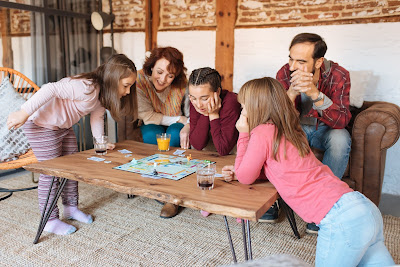Surviving Home Together
As the weeks drag on, this stay at home thing is getting old!
Intellectually, we know, that we’re staying home for the common good. We want to protect the vulnerable, our neighbors, and our family members from the virus.
But emotionally, many of us are feeling trapped. And as a mom, we get the privilege of helping everyone cope with big feelings.
It’s going to be okay.
Though we weren’t able to meet together on Easter, all year round we are an Easter people—and the victory is already won!
By “keeping the long view” and trusting in the Lord, He will comfort us.
By “keeping the long view” and trusting in the Lord, He will comfort us.
We can make some practical changes, too, to make life easier.
Here are some practical considerations that can go a long way to keeping home life more peaceful during this time.
Somebody in My Space
All of a sudden, we need a bigger house. Seriously.
The noise canceling headphones bought for the now-working-from-home husband or wife on Amazon to help tune out the usual kid noises aren’t quite enough. (I find myself saying, “quiet feet, quiet voices,” more than a dozen times a day.)
The noise canceling headphones bought for the now-working-from-home husband or wife on Amazon to help tune out the usual kid noises aren’t quite enough. (I find myself saying, “quiet feet, quiet voices,” more than a dozen times a day.)
College students are suddenly at home, and teens who usually work are home full time, too. More people means more eating, more cooking, more dishes, and more messes.
The “more messes” part also means more shoes, more dirt, and more laundry. (The usual housekeeping definitely isn’t enough.)
And perhaps the biggest change is that when living space is tight, tempers can be short.
The “more messes” part also means more shoes, more dirt, and more laundry. (The usual housekeeping definitely isn’t enough.)
And perhaps the biggest change is that when living space is tight, tempers can be short.
My husband has been a wonderful help in many ways. But often, if I’m honest, I’d rather do it myself. I don’t know about you, but I find my feathers ruffled in some way or another, daily. Because whether it’s my husband or another family member—he (or she) doesn’t quite do things the way I prefer.
This he’s in my space thing is real.
I love my family. So do you. But right now, they’re all—always—in our space!
What do we do?
This he’s in my space thing is real.
I love my family. So do you. But right now, they’re all—always—in our space!
What do we do?
The Answer to “Space Wars”
I’ve learned a few things these past few weeks—and maybe what I’ve learned can help you, too.
First, I bite my tongue.
Regardless of how legitimate the complaint is, when hackles are raised, it’s probably not a good idea to speak in the heat of the moment. Not many of the upheavals, uprisings, and up-endings are true emergencies.
I now think and say (either to myself or aloud), “This can wait until a more appropriate time.”
Now, truth be told, I’ve been totally failing at this in the past few days. But it’s still a goal—and it still helps tremendously when used!
Second, I recite gratitude.
Keeping a gratitude journal, silently repeating prayers of thanksgiving, and having everyone share the best part of the day at dinnertime helps me to focus on the positive (and keep the frustration monster away). When I focus on the gifts instead of the grumblings and thank each person’s attempt to be helpful, healing and positivity can return.
Then, I give grace.
I give grace to myself for yelling. (We all do it, at sometime or another.) I apologize. When others don’t take suggestions well, I give grace then, too.
And yes, more times than not, this is really hard to do. But grace is what diffuses the frustration and puts us on the path to keeping peace in the Space Wars.
We give grace to receive grace. Grace helps us to remember what’s truly important.
We give grace to receive grace. Grace helps us to remember what’s truly important.
We’re home. We’re safe. We’re together.
Never Alone
We are together. All the time. Every day. Morning and night. Weekdays and weekends. Argh!
Now more than ever, it’s tricky to find time to ourselves.
While some tease introverts, saying that the stay at home orders are a dream come true, the truth is, introverts struggle to find a quiet space. When we’re never alone, even extroverts (who typically don’t need as much alone time) feel the strain.
In the whole stay-at-home, stay-in-place dynamic, we can’t escape.
We can’t go to a coffee shop with friends—or enjoy a private latte. We can’t even rely on the grocery store as our time away, since that experience, too, has become so stressful.
How do we make space in our crowded homes to be alone? How do we find space to enjoy our thoughts—or to pray in solitude?
One answer is to get outside.
Step out onto the porch for a few minutes. Regardless of the outdoor weather, grab a breath of fresh-air peace. Take walks. If the weather’s warm enough, bring a chair and a book to the yard for a bit. Maybe Dad can take the kids on a walk, giving Mom a quiet house for at least fifteen minutes (or more).
Another answer is to build a quiet time into the day.
Get up before your children. Use naptime or quiet time in the afternoon to step into the quiet. Or put the kids to bed early, to read for a bit. Taking a much-needed break is priceless.
Use a block of time to pray or do something personally enjoyable, rather than spending the entire time scrambling to get chores completed. Ask the Lord to quiet your soul. Many saints speak of inner peace, and finding the calm in the chaos.
Use a block of time to pray or do something personally enjoyable, rather than spending the entire time scrambling to get chores completed. Ask the Lord to quiet your soul. Many saints speak of inner peace
St. Francis de Sales wrote:
Do not lose your inner peace for anything whatsoever, even if your whole world seems upset.
The whole world is certainly facing an “upset” time—so this is the time to seek inner peace.
Missing Jesus
The one thing that makes my heart ache the most is not being able to receive Jesus in the Eucharist during this time.
I definitely took for granted the great gift of the Most Holy Sacrament, and I go back and forth between sorrow and anger. If you feel the same, this is what brings me consolation.
It’s a good thing to miss the Eucharist, as it demonstrates a proper understanding of the sacrament and acknowledges the good it does our souls. Our ache for the community of our parish is good, too, because the people of the Church are also the Body of Christ.
We need both.
Many saints, especially martyrs, went without the Mass much longer than we will. They know this hurt more than we do, and it helped them get to heaven! Ask these holy men and women to pray for us. Even today, there are places where the Mass cannot be celebrated (when there’s not a pandemic), and we can remember our persecuted brothers and sisters in Christ in prayer, too.
God is with us every moment of every day. Remembering that Truth helps us to deal with being home together, fighting Space Wars, dealing with the need to find our personal alone time, and waiting for the time we attend Mass together again with our brothers and sisters in Christ.
Picture Him in the kitchen, in the living room, and in the hallways of your home.
Take a moment here and there to pray, “Jesus, I Trust in You,” and “Have mercy on me, O God.” He will help us persevere through this pandemic, if we ask.
Take a moment here and there to pray, “Jesus, I Trust in You,” and “Have mercy on me, O God.” He will help us persevere through this pandemic, if we ask.
Regardless of the hour or the location, when we call on the Lord, He hears us.
He has exactly what we need and will help us to get through the pandemic and grow in holiness. Together.
Jenny Bales is a Catholic homeschooling mom who is passionate about encouraging and connecting mothers through their homeschooling journeys. She and her husband live in North Texas with their four children who have been homeschooled all their lives. Her homeschool philosophy is "whatever works" with a smattering of literature-based learning, Charlotte Mason, and Classical elements. Jenny loves hot tea, sweet tea, dark chocolate, red wine, college football, and mystery novels—and can’t resist an opportunity to coordinate a conference, retreat, co-op, book study, social group, and or moms’ night out. Jenny loves to reflect on all aspects of Catholic homeschooling through the lens of our incredible Catholic faith. You can find Jenny and her work at www.heartofamother.net.






































